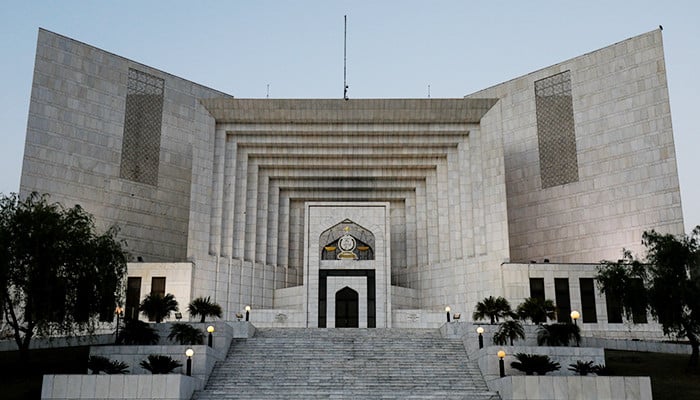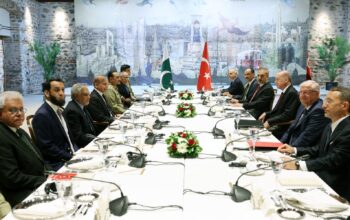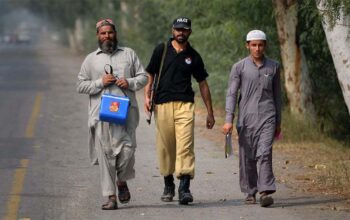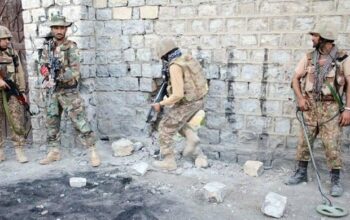By Staff Reporter
ISLAMABAD: The Supreme Court of Pakistan on Wednesday reversed its own decision that had barred the trial of civilians by military courts, paving the way for the army to resume hearing cases of 103 people arrested for vandalizing military installations during nationwide protests in May.
The court’s move came after the caretaker federal government and the ministries of defense and interior filed an intra-court appeal against the October 23 ruling that had declared the trials of civilians in military courts unconstitutional and a violation of their fundamental rights.
The five-judge bench that had issued the earlier verdict — comprising Justices Ijazul Ahsan, Munib Akhtar, Yahya Afridi, Syed Mazahar Ali Akbar Naqvi and Ayesha Malik — was replaced by a six-judge bench headed by Justice Sardar Tariq Masood, who accepted the appeal and suspended the previous order.
The court said it would hear the case in detail in the third week of January, but allowed the military courts to proceed with the trials of the 103 accused in the meantime.
“103 people have been in custody for seven months, it would be appropriate to complete their trial,” Defense Ministry’s lawyer Khawaja Haris argued before the court.
The 103 civilians were among thousands who took to the streets on May 9 to protest the brief arrest of former Prime Minister Imran Khan, who was accused of land corruption. The protesters clashed with security forces and attacked several military facilities, including the headquarters of the Inter-Services Intelligence (ISI), the army’s spy agency and house to top military official in Lahore.
The government and the army announced that those who had damaged army properties would be tried in military courts, which are known for their secretive nature and swift convictions. The decision sparked widespread criticism from human rights groups, lawyers, and opposition parties, who said it undermined the civilian legal system and violated the due process of law.
Pakistan’s Army Act of 1952 established military courts primarily to try members of the military or enemies of the state. Civilians can only be tried under a federal government order.
Civilians accused of offenses such as waging war against the armed forces or law enforcement agencies, or attacking military installations or inciting mutiny, can be tried at military courts.
Military courts operate under a separate system from the civilian legal system and are run by military officers. The judges are also military personnel and cases are tried at military installations.
Trials are closed to outsiders, and no media presence is allowed. Anyone tried under the Army Act has the right to defend themselves and a counsel of their choice.
There is no right to appeal but individuals can challenge the question of jurisdiction in high courts and the Supreme Court.
The October 23 ruling by the Supreme Court had been hailed as a landmark judgment that upheld the supremacy of the Constitution and the rule of law. The ruling had stated that the accused would not be tried in military courts but in criminal courts of competent jurisdiction established under the ordinary or special law of the land.
The ruling had also questioned the formation of the six-judge bench that had heard the case, saying it was not set up by the three-judge committee that is responsible for fixing cases before different benches.
Justice Ijazul Ahsan, who was a member of the committee, had objected to the bench, saying it should be “deemed as not set up by the committee”.
He had recalled how during the fifth meeting of the committee, it was agreed that since the judgment in the trial of civilians by military courts had been rendered by a five-judge bench, a seven-judge bench should be constituted to hear the intra-court appeals. Instead, a six-judge bench was formed, with Justice Sardar Tariq Masood as its head.
“I categorically and in clear terms stated that in order to dispel any impression of pick and choose, all judges of this court in the order of seniority be included in the appellate bench,” Justice Ahsan had stated in a letter to the committee’s secretary.
Former Chief Justice Jawwad S. Khawaja, who is one of the petitioners to challenge the military trials, had also objected to Justice Masood’s inclusion in the bench.
He had stated that Justice Masood, along with Chief Justice Qazi Faez Isa, had recused from being a part of the nine-member bench hearing pleas against the military trials.
The reversal of the Supreme Court’s ruling has raised concerns about the independence of the judiciary and the influence of the military in Pakistan’s politics and legal affairs.
The Lahore High Court Bar Association said it would hold a strike on Thursday and boycott court proceedings in protest of the order.
In a statement, it strongly condemned the decision and voiced its objection to the formation of the bench.
The bar said lawyers did not “accept military courts under any circumstances as the Supreme Court has already declared them void of jurisdiction”.
Copyright © 2021 Independent Pakistan | All rights reserved




